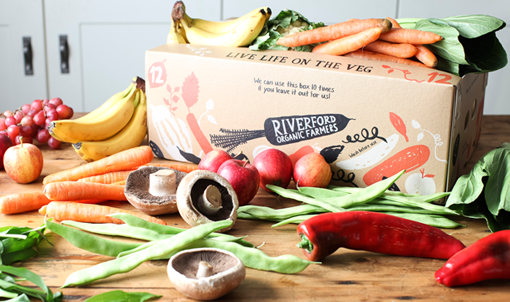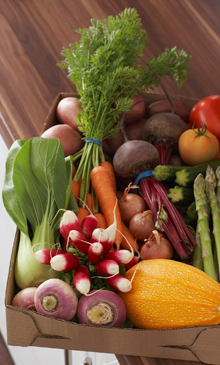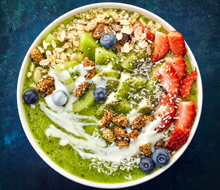Starting a Health Food Franchise
HEALTH FOOD FRANCHISE INDUSTRY
Consumers are becoming increasingly concerned with the origin and nutritional content of their food. Restaurants and suppliers are responding in kind, offering more information about their products and increasing transparency surrounding their preparation processes.
More so than just advertising where their meat originated, as many businesses do, health food franchises oftentimes provide more details about their menu, including how it was prepared, where their produce was grown, any added ingredients, and the total calorie count.
By definition, these health food franchises provide healthy/organic food, either exclusively or in addition to more traditional or standard offerings. Typically their ingredients, preparation techniques, and recipes offer some additional nutritional benefits, such as fortifying food with iron or vitamins.
GROWING TRENDS
"Global sales of healthy food products, in fact, are estimated to reach $1 trillion by 2017, according to Euromonitor. People are seeing the benefits of using food to manage their health, and this is one of the reasons there is growing consumer interest in fresh, natural and organic products. We are expecting continued growth as demand increases." - Chad Parker, CEO of Fresh & Healthy Brands
ORGANIC

Organic products accounted for nearly £2 billion in the UK in 2015, according to The Soil Association. The £1.95 billion total was up 4.9 percent from the previous year, while non-organic food sales dropped by 0.9 percent.
A large portion of the growth stems from a movement towards online ordering online from local producers. Health Food Business puts the growth for the first part of 2016 — through mid-June — at a 5.2 percent increase. If the growth holds, the organic industry will clear £2 billion for 2016.
Particularly among dairy products, fruits and vegetables, more consumers are choosing organic options. With concerns about unnecessary hormones, preservatives, and additives in products, it seems a more sure-bet to go organic. Especially in conjunction with increasing attention on child nutrition and health, parents may be selecting organic for their sons and daughters to bring them peace of mind.
Riverford Organic, a UK franchise business that delivers organic fruits, vegetables, and other products, capitalized on this increased demand. By delivering directly to homes, Riverford makes it easy for their customers to switch to natural produce. Friendly, knowledgeable franchisees who can explain the benefits of going organic during deliveries can increase the likelihood of repeat business and encourage customers to promote the brand via word of mouth.
As individuals' devotion to organic increases, more businesses will join the movement, meaning franchises like Riverford can begin delivering to restaurants and eateries as well, expanding even further.
Additionally, now could be a wonderful time to establish an organic supply business, as the UK and Denmark, with the Organic Trade Board, recently applied for an EU grant to promote and market organic products. If they are selected in October, they will receive £1.7 million annually for 2017-2019 to promote organic. It could provide a significant boost to established organic franchises, as it is essentially free advertising for them.

LOCALLY SOURCED
Consumers like to feel they are supporting their local economy and fellow community members; doing so with their food is no exception.
In their publication, What’s Hot | 2016 Culinary Forecast, the National Restaurant Association topped their list of Top 20 Food Trends with ‘Locally sourced meats and seafood’. Also on the list were locally grown produce (3), hyper-local sourcing (4), natural ingredients/minimally processed food (5) and healthful kids’ meals (7). In general, the trends seem to highlight a move towards a more health conscious public, to which chefs are catering menus.
The Restaurant Industry Forecast for 2016 shows that the number of consumers seeking out local cuisine is on the rise. Among fine-dining eateries, a whopping 92 per cent reported an intention to feature locally sourced menu items this year, along with 73 per cent of casual dining options, according to a National Restaurant Association news report. Their efforts will likely be worthwhile, as almost 60 percent of people interviewed said they’d be more inclined to visit restaurants with locally sourced options.
Using local ingredients and supplies frequently means the food is never frozen or treated with preservatives. This can lead to fresher, better tasting dishes that have a feel of authenticity, as they originated right in the region in which they are served.
VEGETARIANISM

Whether for religious, moral or health reasons, vegetarianism has been increasing in popularity worldwide for quite some time. It has not grown as quickly in the UK — in fact, it has become less common since peaking during the 2008 recession, largely due to financial reasons — but there are still millions of UK citizens who abstain from meat.
According to the Vegetarian Society, vegetarians, in comparison to omnivores, are less likely to have high blood pressure, heart problems, diabetes, and obesity. It may also lower an individual’s chances of developing cancer, as it is believed consuming five servings of fruits and vegetables daily can do so.
The Mintel ‘Meat-Free Foods’ UK Report in 2012 — the last year published — valued the meat-free and free-from markets in the UK at £949 million. The analysis also stated that nearly 40 percent of Britons purchased vegetarian food options at some point throughout the year.
HEALTHY FAST FOOD OPTIONS

Subway, the number one franchise worldwide, is based on the idea of healthy choices in quick, convenient meals. By listing calories for every menu item, they help customers make informed decisions regarding their health, which promotes repeat business. Many other franchises have started following the same model of including nutritional information for their menu; McDonald’s, for example, now includes a calorie count for all their sandwiches and items on their menus and websites.
International franchise business Juice Zone has expanded quickly based on the same idea, selling pure fruit smoothies and juices, organic coffee, and healthy snacks and meals. By marketing everything as To-Go or On-the-Go, Juice Zone has made even the busiest consumers feel they have the time to make the healthy choice. Many consumers already want to make the healthier decision; showing them it won't cost extra time or money ensures they'll choose you and keep coming back.
Pure Health, another UK health food franchise, goes one step farther than offering options healthy for customers; their products are healthy for the earth, as well. They focus on using reclaimed products in their designs, write menus on chalkboards to reduce paper use, and wrap items in bio-degradable packaging. They also help customers stay healthy during cravings and 'cheat' days by offering personal pizzas and desserts in addition to more traditional health fare like juices, soups, wraps and salads.
Many restaurants are also partaking in the British Hospitality Association’s Responsibility Deal Pledges to reduce the amount of salt in dishes by the end of 2017, remove trans fat, and provide additional caloric and nutritional information. The pledge, according to their website, is part of an effort to give consumers adequate information to enable them to make healthy diet choices.
"We have been in business and offering healthier foods for over a decade and have seen healthy food fads come and go. Recently, we see a real surge in demand for healthier foods in most markets around the world. People are wanting to know what’s in their foods, and the fresher the better. I think having nutritional information is important and we offer this at our restaurants, but just as important is also offering the customer information on what the ingredients are, where they came from and how they are prepared." - Chad Parker, CEO of Fresh & Healthy Brands
VITAMINS

In the UK, where the winter gloom can mean going months without any significant sunshine, many people experience vitamin D deficiencies, which can weaken bones, teeth, and muscles. The 2008 to 2012 findings from PHE National Diet and Nutrition Survey reported 23 per cent of adults (19-64) and 22 percent of children (11-18) do not have sufficient vitamin D levels.
News outlet Express reported, in analysing a 2016 Mintel report, that 46 percent of UK adults take daily vitamins/supplements, pushing the UK’s total spending up to £414 million per annum. That’s a five per cent increase over 2015. One of the best-selling products was vitamin D.
Ariix, a franchise business with worldwide opportunities, is a very low-cost start-up that sells a line of health products aimed at weight loss, healthy living, and natural beauty. One of their products, Nutrifii, is a line of supplements aimed at increasing individual wellness. They also offer organic bodycare products and essential oils for the health-minded.
CONCLUSION
As consumers scrutinize their food more closely, franchises need to be aware of their demands. In the hyper-competitive market, it is important to be evolving and keeping up with trends.
Even if health is not the main focus of a food franchise, it could be wise to highlight certain aspects of the business. Putting up signs that explain where your meat and produce come from, promoting vegetarian options, and including even a few organic items could encourage health- and sustainability-conscious consumers to give your franchise a try.
Now, go get your piece of this multi-billion pound industry!














